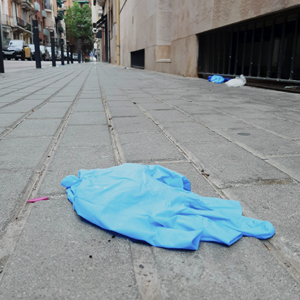
Plastic gloves and disposable masks are probably one of the images that will remain in our minds when we think about the health crisis we are experiencing.
Why are we using disposable gloves? We are facing a still unknown disease with a highly contagious capacity and, as citizens, the only measures we can take are social distancing and exhaustive and constant hand hygiene. Given the fear and feeling of vulnerability that this situation causes, many people think that by using gloves they will be better protected. In fact, as the medical and scientific community has been warning for days, using them can even be dangerous because of the false security feeling they give us.
In addition to not protecting us, gloves can have environmental impacts:
- After becoming aware of the plastic excess that our planet is experiencing, we are now jumping into the mass consumption of another disposable plastic product: gloves.
- Before the coronavirus, abandoned beverage containers could be found on the streets and now we also see gloves lying on the sidewalks, streets, roads, forests and beaches. Unfortunately, we will soon begin to collect evidence of them reaching our seas and oceans.
The message of fear and false hygiene that the plastic industry is offering both in the case of gloves and in the case of packaged food products (we recall that, as indicated by several studies, the virus can survive on plastic surfaces for days) cannot make us take steps back or return to a consumption model that floods our environment with plastic. A material which will take hundreds of years to disappear, with the associated damages to the environment and people’s health.
The message is clear: disposable plastics are in no way a solution to the coronavirus pandemic -but are intrinsically related to the climate crisis that we are already experiencing. We will miss a great opportunity if we are not now able to push for decarbonization and dematerialization policies which accelerate the transition to zero waste. A production model where products are designed with ecodesign, waste minimization, repairability, reuse and – at the end of their useful life – recovery and recycling criteria is necessary. If we do not react, we will contribute to a furt weakened society with less possibility of tackling the climate, materials and energy crisis that we are already experiencing, or the next health crisis.
More information rezero.cat
Related article in La Vanguardia 6-5-2020